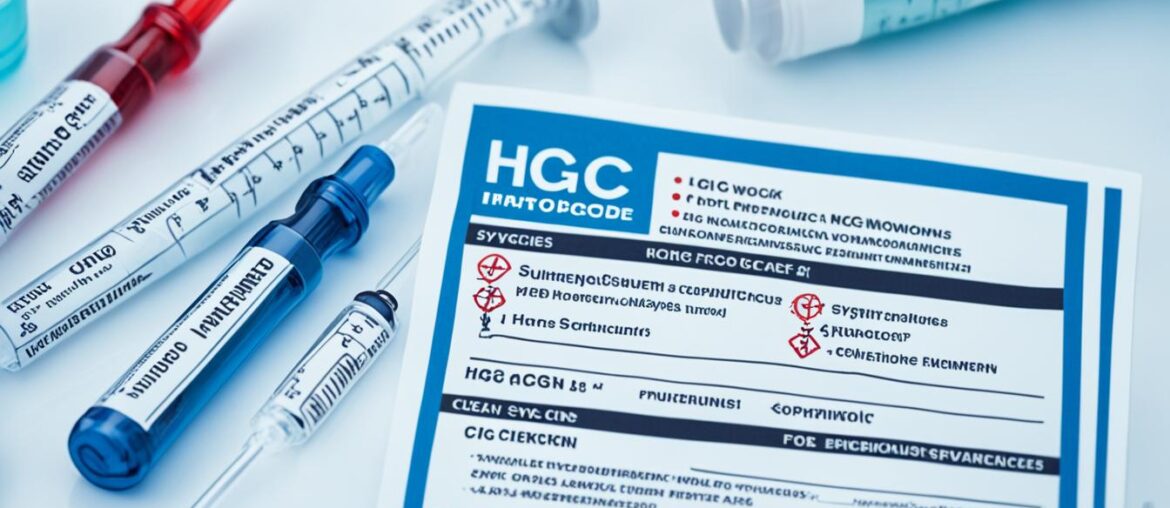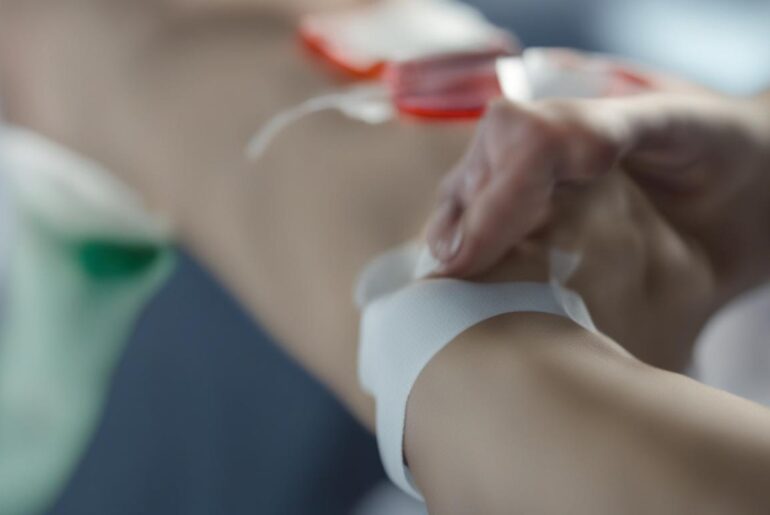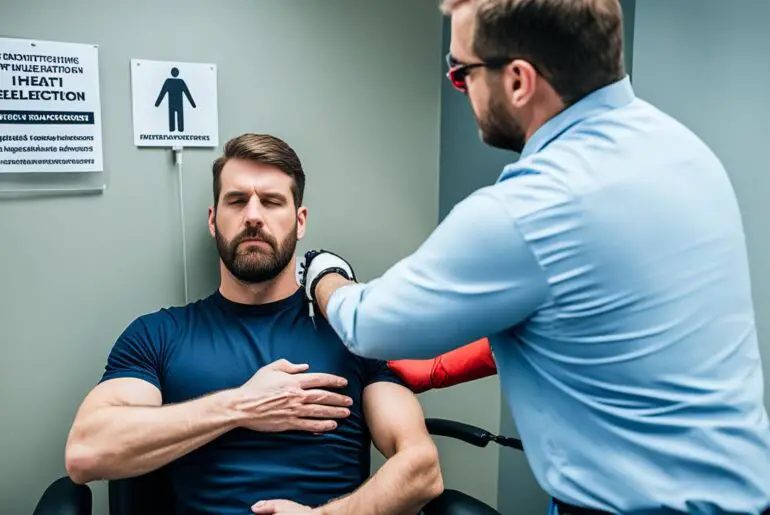Did you know that the safety and efficacy of HCG injections differ between men and women? While both genders can benefit from HCG injections, there are important considerations to keep in mind. Understanding the unique insights for men and women is crucial for optimizing the use of HCG injections and ensuring desired outcomes.
Key Takeaways:
- HCG injections are a safe and effective option for men and women.
- Men who have a history of exogenous testosterone use can benefit from HCG monotherapy.
- HCG can help maintain fertility in men on testosterone therapy.
- Recombinant hCG has different pharmacokinetics compared to urinary hCG.
- HCG injections have various benefits, but research on weight loss is limited.
Testosterone Therapy and Hypogonadism
Testosterone therapy (TRT) is a treatment option for men with testosterone deficiency or hypogonadism. Men experiencing low testosterone levels often suffer from symptoms such as fatigue, reduced libido, and decreased muscle mass. TRT involves the administration of exogenous testosterone, which effectively increases serum testosterone levels and alleviates the symptoms of hypogonadism.
However, it is important to note that TRT can have certain side effects. Exogenous testosterone can suppress the natural production of luteinizing hormone (LH) and follicle-stimulating hormone (FSH) in the body, leading to a decrease in fertility. Nevertheless, there is a solution to this issue. Human chorionic gonadotropin (HCG), which shares similar properties with LH, can stimulate the production of endogenous testosterone and help maintain fertility in men undergoing TRT.
The American Urological Association recommends the use of HCG for testosterone-deficient men who have concerns about their fertility. By including HCG in the treatment protocol, men can preserve their reproductive potential while benefiting from the positive effects of TRT on their hypogonadal symptoms.
HCG not only helps in stimulating endogenous testosterone production but also maintains the normal functioning of the testes. This can be particularly valuable for men planning to have children in the future or those who wish to avoid the adverse effect of exogenous testosterone on fertility.
“HCG is a valuable adjunct for men who prefer not to pursue testosterone replacement therapy or want to maintain their fertility. It offers an alternative approach to managing hypogonadism while ensuring the preservation of reproductive capability.”
It is essential to consult a healthcare provider before initiating testosterone therapy or considering HCG as part of the treatment plan for hypogonadism. They will evaluate individual needs and determine the appropriate dosage and administration schedule to achieve optimal results.
Benefits of Testosterone Therapy and HCG
The combination of testosterone therapy and HCG provides multiple benefits to men with hypogonadism:
- Increased testosterone levels: TRT effectively raises serum testosterone levels, relieving symptoms such as fatigue and low libido.
- Fertility preservation: Adding HCG to the treatment regimen stimulates endogenous testosterone production, helping to maintain fertility.
- Improved sexual function: Many men notice an improvement in sexual function, including increased libido and better erectile function.
- Enhanced muscle mass and strength: Testosterone therapy can promote muscle growth and improve physical performance in men with hypogonadism.
- Increased bone density: TRT has been shown to increase bone mineral density, reducing the risk of osteoporosis.
Overall, testosterone therapy combined with HCG can significantly improve the quality of life for men with testosterone deficiency or hypogonadism. It addresses the symptoms associated with low testosterone while preserving fertility and reproductive function.
With the help of testosterone therapy and HCG, men can regain their vitality and well-being, enhancing their overall health and happiness.
The Pharmacokinetics of Recombinant hCG
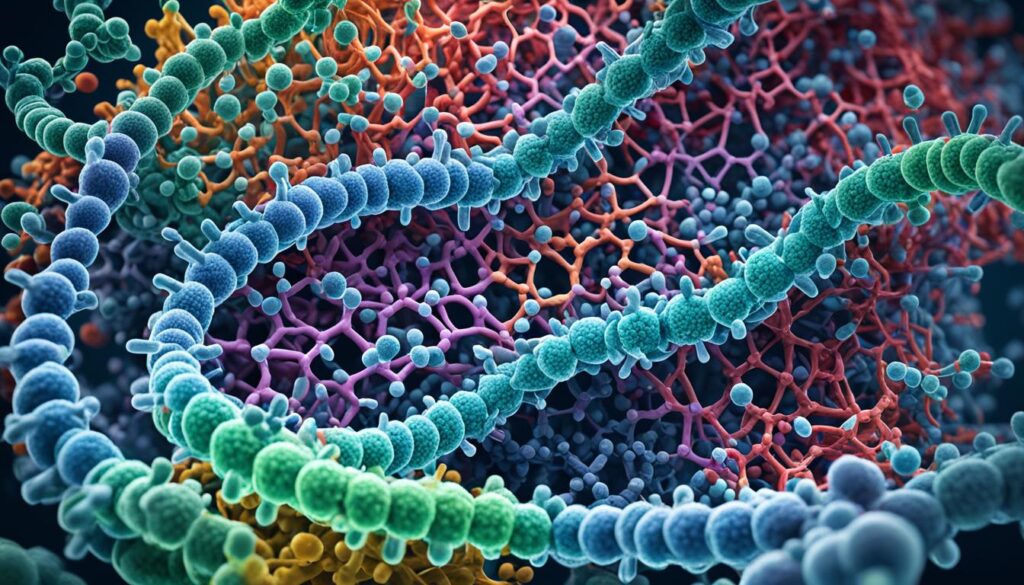
Recombinant human chorionic gonadotropin (rhCG) is a novel form of hCG that is produced by a human cell line. The pharmacokinetics (PK) of rhCG were evaluated in a first-in-human trial, which included both men and women. The study found that the PK of rhCG differed from that of urinary hCG. CG beta, a specific type of rhCG, had a longer terminal half-life and lower clearance compared to CG alfa, another form of rhCG. These differences in PK may have implications for the therapeutic use of rhCG and may require lower doses compared to current hCG preparations. Further research is needed to explore the full potential of rhCG.
The pharmacokinetics of recombinant hCG (rhCG) were evaluated in a first-in-human trial, which included both men and women. The study found that rhCG differs from urinary hCG in terms of its pharmacokinetic profile. Specifically, CG beta, a type of rhCG, demonstrated a longer terminal half-life and lower clearance compared to CG alfa, another form of rhCG. These differences in pharmacokinetics may have implications for the therapeutic use of rhCG and indicate that lower doses of rhCG may be required compared to current hCG preparations. Further research is needed to fully understand the potential benefits and optimal dosing of rhCG.
Using hCG with TRT
When it comes to testosterone replacement therapy (TRT), one concern for men is the potential decrease in fertility. However, there is a solution that can help address this issue – human chorionic gonadotropin (hCG) injections.
hCG is a hormone that mimics luteinizing hormone (LH) in the body. LH plays a crucial role in stimulating testosterone and sperm production in the testes. By using hCG alongside TRT, men can experience a range of benefits beyond just preserving fertility.
One of the primary advantages of using hCG with TRT is the potential improvement in sexual function. hCG injections have been found to enhance libido and sexual performance in men who may not see significant improvements with testosterone therapy alone.
Studies have also shown that hCG can positively impact sperm count, which is important for men who are looking to conceive. By stimulating sperm production in the testes, hCG can help improve overall fertility levels.
| Benefits of Using hCG with TRT: |
|---|
| Enhanced libido and sexual function |
| Improved sperm count and fertility |
| Better sleep quality and mental alertness |
| Increased exercise capacity |
Additionally, hCG has been found to have positive effects on sleep quality, mental alertness, and exercise capacity. Men on hCG injections alongside TRT have reported better sleep patterns, increased mental clarity, and improved physical performance during workouts.
It’s worth noting that studies have shown that low-dose hCG can help preserve fertility in men on TRT without significantly impacting testosterone levels. This means that men can enjoy the benefits of TRT while still protecting their ability to conceive.
Overall, using hCG with TRT offers a comprehensive approach to addressing the potential side effect of decreased fertility in men. With the ability to preserve fertility, enhance sexual function, and improve overall well-being, hCG injections provide a valuable addition to TRT for men with hypogonadism.
When it comes to TRT and fertility, hCG injections are a game-changer. By stimulating testosterone and sperm production, hCG preserves fertility while enhancing libido, sleep quality, mental alertness, and exercise capacity.
References
- Home > Blog > Reasons to Use hCG with TRT
Benefits of hCG Injections
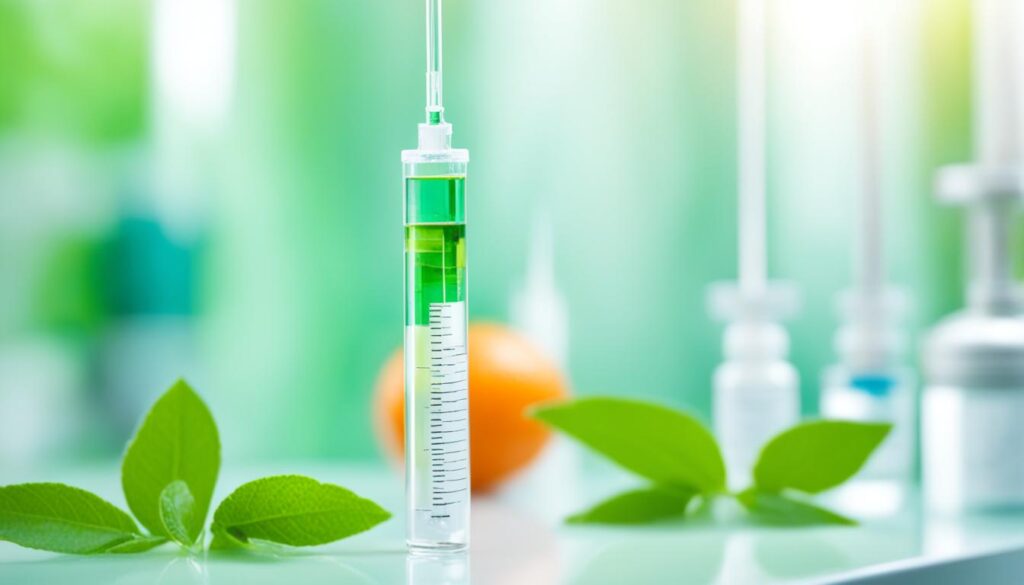
In addition to its use in combination with Testosterone Replacement Therapy (TRT), hCG injections offer several other benefits.
Improved Sexual Function
For men who don’t experience significant improvements with testosterone therapy alone, hCG injections have been used to enhance sexual function. By stimulating testosterone production, hCG can help address issues like low libido and erectile dysfunction.
Treatment for Undescended Testes
Undescended testes is a condition where the testes fail to descend properly during fetal development. hCG injections can be used to stimulate the descent of the testes, promoting proper development and function.
Support for Bodybuilding
Bodybuilders often use hCG injections in conjunction with steroids to prevent side effects like infertility. By maintaining testosterone levels, hCG helps preserve fertility while enhancing muscle development and recovery.
Restoration of Testosterone Levels
Following surgeries or medical treatments that affect testosterone levels, hCG injections can be used to restore hormonal balance. By stimulating testosterone production in the testes, hCG helps alleviate the symptoms of low testosterone.
Weight Loss (Limited Evidence)
Despite claims of hCG injections aiding in weight loss, there is limited scientific evidence supporting this notion. While some individuals may report weight loss while using hCG injections, this is likely due to associated diet and exercise modifications rather than the direct effect of hCG itself.
Overall, hCG injections offer potential benefits in terms of sexual function, undescended testes treatment, bodybuilding support, and testosterone level restoration. However, it is essential to consult with a healthcare professional to determine the appropriate use and potential risks associated with hCG injections.
Safety of hCG Injections
When it comes to hCG injections, safety is a key consideration for both men and women. These injections have received approval from the FDA and are generally considered safe for use. However, it’s important to be aware of potential side effects that may occur.
Common side effects of hCG injections include:
- Breast enlargement (gynecomastia)
- Acne
- Redness at the injection site
- Headaches
- Nausea
- Stomachache
It’s important to note that these side effects are usually temporary and typically resolve on their own as the body adjusts to the injections. Most individuals do not experience severe or long-lasting side effects.
“These side effects are usually temporary and resolve on their own as the body adjusts to the injections.”
However, in rare cases, more severe side effects may occur. These can include:
- Blood clots
- Mild skin rashes
- Anaphylactic reactions
Although these severe side effects are rare, it is crucial to consult with a healthcare provider before starting hCG injections and to use them under their supervision. They can provide guidance on proper usage and monitor for any potential adverse reactions.
Overall, while hCG injections are generally safe, it is important to be informed about the potential side effects and to use them responsibly and under medical supervision.
References:
- Home > Blog > Reasons to Use hCG with TRT
Administration and Dosage of hCG Injections

When it comes to administering hCG injections, the typical method is subcutaneous injection into the lower abdomen. This ensures proper absorption of the hormone into the bloodstream.
It is essential to follow the recommended dosage for hCG injections. The usual dosage ranges from 350 to 500 IU (international units), administered two to three times per week. It is crucial to maintain a consistent interval between injections to keep hCG levels stable in the blood.
Proper handling and storage of the hCG kit are vital for maintaining the integrity of the hormone. Be sure to store the kit in a cool, dry place and follow the storage instructions provided.
To prepare the hCG injection, add bacteriostatic water to the dried hCG vial according to the instructions. After proper preparation, administer the injection as directed by a healthcare provider.
Key Points:
- Administer hCG injections subcutaneously in the lower abdomen.
- Follow the recommended dosage of 350 to 500 IU, two to three times per week.
- Maintain a consistent interval between injections to ensure stable hCG levels.
- Handle the hCG kit properly and store it according to the provided instructions.
- Prepare the injection by adding bacteriostatic water to the dried hCG vial.
- Administer the injection as directed by a healthcare provider.
By following the proper administration and dosage guidelines, individuals can maximize the benefits of hCG injections and ensure their safety and efficacy.
Research on hCG and Testosterone

Several studies have demonstrated the effectiveness of hCG injections in preserving fertility and promoting sperm production in men undergoing testosterone therapy.
In one study involving men with low testosterone levels, the administration of hCG injections alongside testosterone therapy did not result in any significant changes in semen parameters. However, it led to increased hormone levels, suggesting that hCG injections may have a positive impact on testosterone production (source: Home > Blog > Reasons to Use hCG with TRT).
“hCG injections, when combined with testosterone therapy, do not negatively affect semen parameters and can help increase hormone levels in men with low testosterone.” (source: Home > Blog > Reasons to Use hCG with TRT)
Another study revealed that hCG can restore spermatogenesis in men whose fertility has been affected by steroid use. This finding suggests that hCG injections can help mitigate the negative effects of testosterone therapy on fertility and sperm production (source: Home > Blog > Reasons to Use hCG with TRT).
Overall, the research supports the use of hCG injections as an adjunct therapy to counteract the potential side effects of testosterone therapy on fertility and maintain healthy semen parameters (source: Home > Blog > Reasons to Use hCG with TRT).
Note: The section 8 image showcases the importance of research and its positive findings related to hCG injections and testosterone therapy.
Conclusion
HCG injections have been extensively studied and have proven to be a safe and effective option for preserving fertility in men undergoing testosterone therapy, also known as TRT. By stimulating testosterone and sperm production in the testes, hCG injections help mitigate the negative impact of TRT on fertility. Furthermore, hCG injections offer additional benefits, such as improving sexual function and treating certain health conditions.
It is crucial to emphasize that the use of hCG injections should always be done under the supervision of a healthcare provider. While generally safe, potential side effects like gynecomastia (breast enlargement), acne, and injection site reactions should be monitored. Being aware of these possible side effects allows for timely intervention and management.
Further research is needed to fully understand the optimal use and benefits of hCG injections in both men and women. As the field of hormone therapy continues to evolve, ongoing studies will provide valuable insights into the efficacy and safety of hCG injections in promoting fertility and managing conditions such as hypogonadism.
In conclusion, hCG injections represent a promising approach to address fertility concerns in men undergoing testosterone therapy. Their potential to stimulate testosterone and sperm production, improve sexual function, and treat certain health conditions makes them an important tool in the realm of hormone therapy. As more research is conducted, we can expect further advancements in the optimal use of hCG injections to benefit both men and women seeking to address hypogonadism and fertility concerns.
FAQ
Are HCG injections safe for both men and women?
Yes, HCG injections are generally considered safe for both men and women. However, it is important to use them under the supervision of a healthcare provider to ensure proper dosage and monitoring of potential side effects.
What are the common side effects of HCG injections?
Common side effects of HCG injections include breast enlargement (gynecomastia), acne, redness at the injection site, headaches, nausea, and stomachache. These side effects are usually temporary and resolve on their own as the body adjusts to the injections.
What are the potential benefits of HCG injections?
HCG injections can help improve sexual function in men who do not see improvements with testosterone therapy alone. They can also be used to treat undescended testes and restore testosterone levels affected by surgery or medical treatments.
Can HCG injections be used for weight loss?
While some people use HCG injections for weight loss, there is limited evidence to support its effectiveness in this regard. It is important to consult with a healthcare provider before using HCG injections for weight loss.
How do I administer HCG injections?
HCG injections are typically administered subcutaneously into the lower abdomen. The recommended dose is 350 to 500 IU, 2 to 3 times per week. It is important to follow the instructions provided by a healthcare provider and store the HCG kit properly.
Is HCG effective in preserving fertility in men on testosterone therapy?
Yes, studies have shown that HCG injections can preserve fertility and promote sperm production in men on testosterone therapy. HCG stimulates testosterone and sperm production in the testes, reducing the negative impact on fertility.
Are there any potential side effects of HCG injections?
In rare cases, more severe side effects such as blood clots, mild skin rashes, and anaphylactic reactions may occur. It is important to consult with a healthcare provider and use HCG injections under their supervision.
What is the recommended dosage for HCG injections?
The recommended dose of HCG is 350 to 500 IU, 2 to 3 times per week. The injections should be given at a consistent interval to maintain stable HCG levels in the blood. It is important to follow the instructions provided by a healthcare provider.
Does HCG have any impact on testosterone levels?
HCG injections can increase testosterone levels in men, which can have positive effects on libido, sperm count, sleep quality, mental alertness, and exercise capacity.
Is there any research on the combination of HCG and testosterone?
Yes, several studies have shown the efficacy of HCG injections in preserving fertility and promoting sperm production in men on testosterone therapy. HCG can help mitigate the side effects of testosterone therapy on fertility.

